-
Catastrophe and Catalyst: Pakistan’s Foreign Minister on His Nation’s Climate Tragedy
›
On a recent visit to the Wilson Center, Pakistan’s Foreign Minister Bilawal Bhutto Zardari remarked on the historic nature of the monsoon-related floods that have submerged a huge swath of his country over the last several months.
“These are no normal monsoons and no normal floods,” said Zardari. “We are used to monsoons. We are used to floods. We have provincial mechanisms [and] national mechanisms to deal with such disasters. What we were not prepared for was for floods to descend from the sky.”
-
Addressing the Global Food Crisis: CIMMYT Experts Weigh In
› The confluence of climate change, COVID-19, and the war in Ukraine have placed enormous stress on food systems across the globe. Food insecurity spiked in 2020 and has stayed high, and the number of undernourished people is on the rise.
The confluence of climate change, COVID-19, and the war in Ukraine have placed enormous stress on food systems across the globe. Food insecurity spiked in 2020 and has stayed high, and the number of undernourished people is on the rise. -
Transformative Climate Security: A Conversation with Josh Busby
› Why does climate change lead to especially bad security outcomes in some places but not others? In this week’s New Security Broadcast, Josh Busby, Associate Professor at the LBJ School of Public Affairs at the University of Texas-Austin, discusses the latest thinking on this essential question as laid out in his new book, States and Nature: The Effects of Climate Change on Security, with ECSP Program Associate, Amanda King, and ECSP Senior Fellow, Sherri Goodman.
Why does climate change lead to especially bad security outcomes in some places but not others? In this week’s New Security Broadcast, Josh Busby, Associate Professor at the LBJ School of Public Affairs at the University of Texas-Austin, discusses the latest thinking on this essential question as laid out in his new book, States and Nature: The Effects of Climate Change on Security, with ECSP Program Associate, Amanda King, and ECSP Senior Fellow, Sherri Goodman.
-
New Security Broadcast | Clionadh Raleigh on Reframing “Climate Security”
› About half the world’s population lives in an area of active or latent conflict. And few corners of the planet are not feeling the effects of climate change. But in this week’s New Security Broadcast, researcher Clionadh Raleigh cautions against drawing too strong a connection between the two phenomena in an interview with ECSP Director Lauren Risi.
About half the world’s population lives in an area of active or latent conflict. And few corners of the planet are not feeling the effects of climate change. But in this week’s New Security Broadcast, researcher Clionadh Raleigh cautions against drawing too strong a connection between the two phenomena in an interview with ECSP Director Lauren Risi. -
New Security Broadcast | Jeff Colgan on Oil Politics and International Order
› Debates around whether and to what extent international order is changing can be misguided “so long as we are thinking about international order as a single, monolithic thing,” says Jeff Colgan, Associate Professor of Political Science and director of the Climate Solutions Lab at Brown University in this week’s episode of New Security Broadcast. Colgan spoke at a recent Wilson Center event featuring his new book, Partial Hegemony: Oil Politics and International Order. In the book, Colgan challenges the idea of a monolithic ‘global order’ and shows that international order instead comprises a set of interlinked “subsystems.” In a world where there is no single, all-encompassing hegemon to trigger universal global change, this framework of subsystems allows us to explore how particular geopolitical realms can alter without fundamentally changing the geopolitical landscape, he says.
Debates around whether and to what extent international order is changing can be misguided “so long as we are thinking about international order as a single, monolithic thing,” says Jeff Colgan, Associate Professor of Political Science and director of the Climate Solutions Lab at Brown University in this week’s episode of New Security Broadcast. Colgan spoke at a recent Wilson Center event featuring his new book, Partial Hegemony: Oil Politics and International Order. In the book, Colgan challenges the idea of a monolithic ‘global order’ and shows that international order instead comprises a set of interlinked “subsystems.” In a world where there is no single, all-encompassing hegemon to trigger universal global change, this framework of subsystems allows us to explore how particular geopolitical realms can alter without fundamentally changing the geopolitical landscape, he says. -
The Fight for Climate After COVID-19: A Conversation With Sherri Goodman and Author, Alice Hill
› The impacts of COVID-19 have shown policymakers that we need to invest in infrastructure and shore up existing systems to ensure that they can withstand changing conditions over time, says Alice Hill, former special assistant to President Barack Obama and current senior fellow at the Council on Foreign Resilience, in this week’s New Security Broadcast. “As we go forward, we need to have resilient systems. But we haven’t done that yet, we’re unprepared.” Hill sat down with Sherri Goodman, Senior Fellow at the Wilson Center’s Environmental Change and Security Program and former U.S. Deputy Undersecretary of Defense, to her new book, The Fight for Climate After COVID-19, and how the response to COVID-19 can inform approaches to building climate resilience.
The impacts of COVID-19 have shown policymakers that we need to invest in infrastructure and shore up existing systems to ensure that they can withstand changing conditions over time, says Alice Hill, former special assistant to President Barack Obama and current senior fellow at the Council on Foreign Resilience, in this week’s New Security Broadcast. “As we go forward, we need to have resilient systems. But we haven’t done that yet, we’re unprepared.” Hill sat down with Sherri Goodman, Senior Fellow at the Wilson Center’s Environmental Change and Security Program and former U.S. Deputy Undersecretary of Defense, to her new book, The Fight for Climate After COVID-19, and how the response to COVID-19 can inform approaches to building climate resilience. -
Happy World Gorilla Day! A Conversation with Dr. Gladys Kalema-Zikusoka on COVID-19’s Impact on Gorilla Conservation and Public Health in Uganda
› “When we started out, people thought it was weird. ‘Why are you integrating people and animals and why are you integrating human health and animal health?’” says Kalema-Zikusoka, founder of Conservation Through Public Health (CTPH), in this week’s New Security Broadcast. Indeed, health infrastructure and conservation have long been organized around distinct silos. “Donors were focusing on single sector funding, and government departments were aligned along single sectors,” says Kalema-Zikusoka.
“When we started out, people thought it was weird. ‘Why are you integrating people and animals and why are you integrating human health and animal health?’” says Kalema-Zikusoka, founder of Conservation Through Public Health (CTPH), in this week’s New Security Broadcast. Indeed, health infrastructure and conservation have long been organized around distinct silos. “Donors were focusing on single sector funding, and government departments were aligned along single sectors,” says Kalema-Zikusoka. -
Introducing New Security Broadcast
› “To inform the most pressing issues of our time, to bring new voices to the policy space, and to help our audience better understand these complex connections and where we can be most effective in our responses, we bring you the New Security Broadcast,” says Lauren Risi, Director of the Wilson Center’s Environmental Change and Security Program (ECSP), in today’s launch of ECSP’s new podcast series, New Security Broadcast.
“To inform the most pressing issues of our time, to bring new voices to the policy space, and to help our audience better understand these complex connections and where we can be most effective in our responses, we bring you the New Security Broadcast,” says Lauren Risi, Director of the Wilson Center’s Environmental Change and Security Program (ECSP), in today’s launch of ECSP’s new podcast series, New Security Broadcast.
Showing posts from category New Security Broadcast.


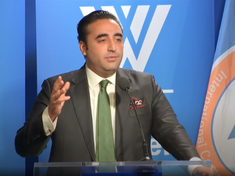
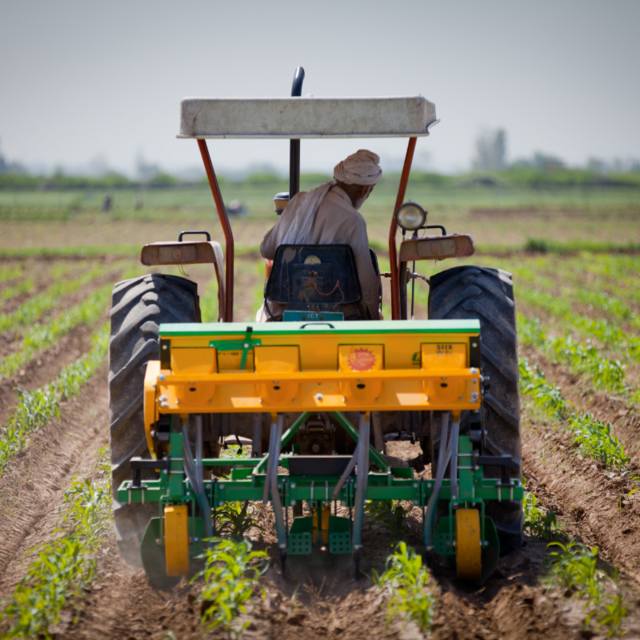 The confluence of climate change, COVID-19, and the war in Ukraine have placed enormous stress on food systems across the globe.
The confluence of climate change, COVID-19, and the war in Ukraine have placed enormous stress on food systems across the globe. 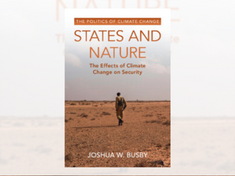 Why does climate change lead to especially bad security outcomes in some places but not others? In this week’s New Security Broadcast, Josh Busby, Associate Professor at the LBJ School of Public Affairs at the University of Texas-Austin, discusses the latest thinking on this essential question as laid out in his new book,
Why does climate change lead to especially bad security outcomes in some places but not others? In this week’s New Security Broadcast, Josh Busby, Associate Professor at the LBJ School of Public Affairs at the University of Texas-Austin, discusses the latest thinking on this essential question as laid out in his new book, 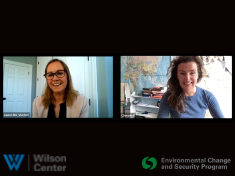 About half the world’s population lives in an area of active or latent conflict. And few corners of the planet are not feeling the effects of climate change. But in this week’s New Security Broadcast, researcher Clionadh Raleigh cautions against drawing too strong a connection between the two phenomena in an interview with ECSP Director Lauren Risi.
About half the world’s population lives in an area of active or latent conflict. And few corners of the planet are not feeling the effects of climate change. But in this week’s New Security Broadcast, researcher Clionadh Raleigh cautions against drawing too strong a connection between the two phenomena in an interview with ECSP Director Lauren Risi.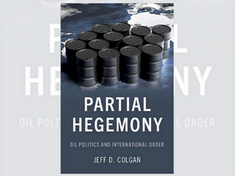 Debates around whether and to what extent international order is changing can be misguided “so long as we are thinking about international order as a single, monolithic thing,” says Jeff Colgan, Associate Professor of Political Science and director of the Climate Solutions Lab at Brown University in this week’s episode of New Security Broadcast. Colgan spoke at a recent Wilson Center
Debates around whether and to what extent international order is changing can be misguided “so long as we are thinking about international order as a single, monolithic thing,” says Jeff Colgan, Associate Professor of Political Science and director of the Climate Solutions Lab at Brown University in this week’s episode of New Security Broadcast. Colgan spoke at a recent Wilson Center 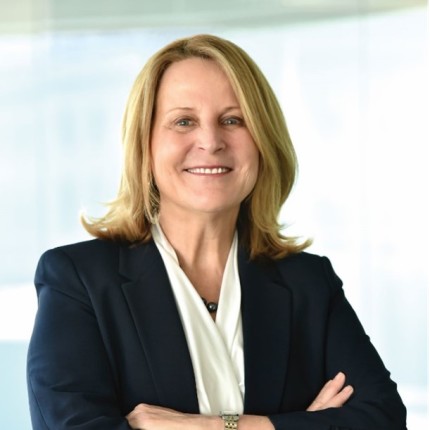
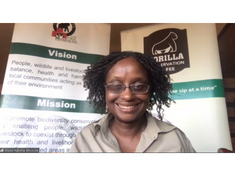 “When we started out, people thought it was weird. ‘Why are you integrating people and animals and why are you integrating human health and animal health?’” says Kalema-Zikusoka, founder of
“When we started out, people thought it was weird. ‘Why are you integrating people and animals and why are you integrating human health and animal health?’” says Kalema-Zikusoka, founder of  “To inform the most pressing issues of our time, to bring new voices to the policy space, and to help our audience better understand these complex connections and where we can be most effective in our responses, we bring you the New Security Broadcast,” says Lauren Risi, Director of the Wilson Center’s Environmental Change and Security Program (ECSP), in today’s launch of ECSP’s new podcast series, New Security Broadcast.
“To inform the most pressing issues of our time, to bring new voices to the policy space, and to help our audience better understand these complex connections and where we can be most effective in our responses, we bring you the New Security Broadcast,” says Lauren Risi, Director of the Wilson Center’s Environmental Change and Security Program (ECSP), in today’s launch of ECSP’s new podcast series, New Security Broadcast.

